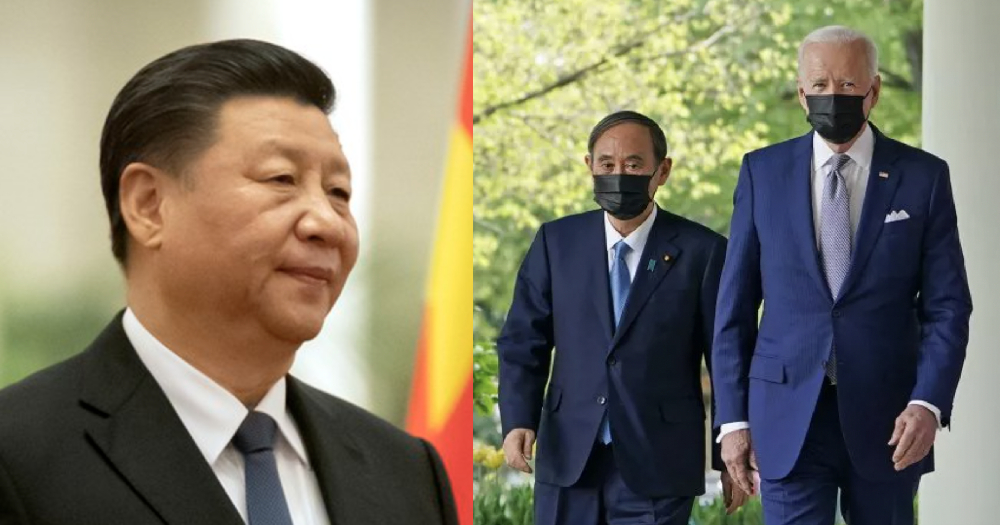China has hit back at the United States and Japan for a joint summit statement that included a mention of Taiwan.
U.S. & Japan mentioning Taiwan for the first time in five decades
U.S. President Joe Biden and Japanese Prime Minister Yoshihide Suga, following their meeting at the White House in Washington, D.C., stressed the "importance of peace and stability across the Taiwan Strait" in a leaders' statement.
In addition, they said in their statement that they share "serious concerns regarding the human rights situations" in Hong Kong and Xinjiang.
Nevertheless, they emphasised their intention to work with China on areas of "common interest".
It was the first time that leaders from both countries have brought up Taiwan in a joint statement in over 50 years, according to NHK.
The last time both countries mentioned Taiwan was in a 1969 statement released following a summit between then-U.S. President Richard Nixon and then-Japanese Prime Minister Sato Eisaku.
This took place before they normalised diplomatic relations with China -- Japan did so in 1970, while the U.S. did the same in 1978.
South China Sea
The U.S. and Japan also raised their opposition to "any unilateral attempts to change the status quo in the East China Sea" -- a reference to the Senkaku Islands (known as Diaoyu Dao in China) that are administered by Japan, but also claimed by China.
In addition, they voiced their objection to China's "unlawful maritime claims and activities in the South China Sea".
China claims all the territorial waters within the "nine-dash line", which encompasses about 90 per cent of the entire South China Sea.
Satellite images have shown that amid territorial disputes among numerous claimants, including Southeast Asian countries like Vietnam and the Philippines, China has been steadily increasing its military build-up on artificial islands in the South China Sea.
China hits back
In a statement released hours after the joint leaders' statement, the Chinese embassy in the U.S. reiterated its long-held stance on the self-ruling island, saying that "Taiwan, Hong Kong and Xinjiang belong to China's internal affairs".
Along with the East China Sea and the South China Sea, these matters touch on China's "fundamental interests", and China does not allow any interference, the embassy said.
China commented further on its opposition to the joint statement, saying the comments made have "gone far beyond the scope of normal development of bilateral relations", and are "harmful" to the peace and stability of the Asia-Pacific.
The embassy said: "The scheme of the U.S. and Japan goes against the trend of the times and the will of people in the region."
"Though it is designed to undermine others, it will only end up hurting themselves."
China sees Taiwan as one of the "core" issues that has no place for negotiation.
While the U.S. does not recognise Taiwan as a sovereign entity, it is obligated to provide the island with the means to defend itself under the Taiwan Relations Act.
Taiwan welcomes statement
As for Taiwan, it has welcomed the statement.
Foreign Ministry spokesperson Joanne Ou said Taiwan will continue to work closely with the U.S., Japan and other like-minded countries, Kyodo reported.
We welcome the statement by @POTUS & @sugawitter in which they underscore the importance of peace & stability across the Taiwan Strait. #Taiwan🇹🇼 will keep working with the #US🇺🇸, #Japan🇯🇵 & other like-minded partners in forging a free & open #IndoPacific. https://t.co/g2VKp3hPZQ
— 外交部 Ministry of Foreign Affairs, ROC (Taiwan) 🇹🇼 (@MOFA_Taiwan) April 17, 2021
She added that Taiwan plays a key role in regional stability and prosperity due to its strategic position in the "first island chain".
Top image by Mandel Ngan/AFP via Getty Images
If you like what you read, follow us on Facebook, Instagram, Twitter and Telegram to get the latest updates.
